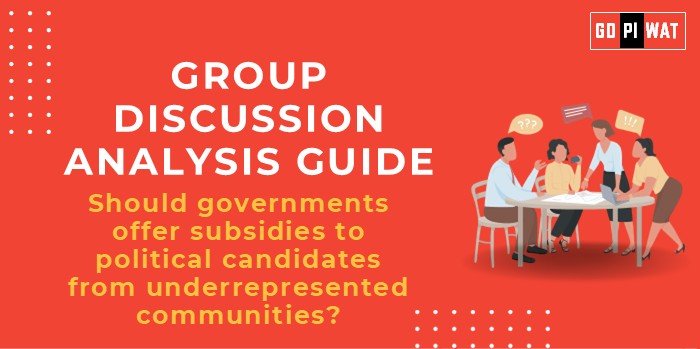📋 Group Discussion (GD) Analysis Guide
Topic: Should Governments Offer Subsidies to Political Candidates from Underrepresented Communities?
🌟 Introduction to the Topic
Opening Context: Governments worldwide strive to create a level playing field in political representation. Subsidies for underrepresented communities aim to bridge gaps in representation and strengthen democratic structures.
Topic Background: Marginalized groups often face systemic disadvantages that hinder political participation. Subsidies can counter financial barriers, enhancing their presence in legislative bodies. Recent debates around such initiatives highlight concerns over fairness, efficacy, and broader societal impact.
📊 Quick Facts and Key Statistics
- 🌍 Global Political Gender Gap: Women held only 26.7% of parliamentary seats globally in 2023 (IPU).
- 🇮🇳 Representation of Minorities in Politics: In India, Scheduled Castes and Tribes hold 24% of Lok Sabha seats, reflecting reservation policies but gaps remain in leadership roles.
- 💰 Financial Barriers: Political campaigns in major democracies can cost millions; in the US, the average Senate race cost $10.3 million in 2022 (OpenSecrets).
👥 Stakeholders and Their Roles
- 🏛️ Governments: Provide subsidies and enforce fair representation laws.
- 🏢 Political Parties: Nominate diverse candidates and ensure equitable distribution of campaign resources.
- 🌐 Civil Society Organizations: Advocate for underrepresented groups and monitor policy implementation.
- 🗳️ Electorate: Play a pivotal role by supporting inclusive candidates.
✅ Achievements and Challenges
🏆 Achievements:
- 🌏 Enhanced Representation: Quota-based subsidies increased women’s participation in Rwanda’s Parliament to 61.3% (2023).
- 🎓 Democratization of Politics: Local bodies in India saw significant representation gains for women post-reservation policies.
- 💡 Reduced Financial Inequities: Public funding systems in Germany enabled equitable campaigns.
⚠️ Challenges:
- ⚖️ Perceived Tokenism: Critics argue quotas may dilute meritocracy.
- 💵 Misallocation of Funds: Risk of subsidies being misused for non-campaign purposes.
- 🔄 Limited Reach: Subsidies may not address deeper socio-political biases.
🌍 Global Comparisons
- 🇿🇦 South Africa: Implementation of proportional representation enhanced diversity in Parliament.
- 🇸🇪 Sweden: Effective party-driven initiatives reduced gender and ethnic gaps in politics.
📌 Structured Arguments for Discussion
- 🔹 Supporting Stance: “Subsidies ensure fair participation for marginalized groups, leveling the playing field in politics.”
- 🔹 Opposing Stance: “Financial subsidies compromise meritocracy and divert taxpayer money from essential services.”
- 🔹 Balanced Perspective: “While subsidies promote diversity, mechanisms for transparency and accountability must accompany them.”
🔍 Effective Discussion Approaches
- 📈 Opening Approaches:
- “A democracy is only as strong as its inclusivity.”
- “Are subsidies the best way to enhance political diversity?”
- 🔄 Counter-Argument Handling:
- Highlight international successes while addressing cultural differences.
- Emphasize complementary reforms like voter education and anti-discrimination laws.
📈 Strategic Analysis of Strengths and Weaknesses
- ✅ Strengths: Promotes equity, improves democracy, increases voter engagement.
- ⚠️ Weaknesses: Risk of misuse, high implementation cost.
- 🌟 Opportunities: Public-private partnerships, international collaboration.
- ⚡ Threats: Resistance from dominant groups, potential legal challenges.
🎓 Connecting with B-School Applications
- 💡 Real-World Applications:
- Policy analysis, campaign management, diversity initiatives in corporate leadership.
- 💬 Sample Interview Questions:
- “How can subsidies for political candidates inspire corporate inclusivity programs?”
- “Should governments prioritize subsidies over other forms of political empowerment?”
- 📘 Insights for Students: Understand resource allocation, stakeholder management, and the impact of diversity on organizational success.


